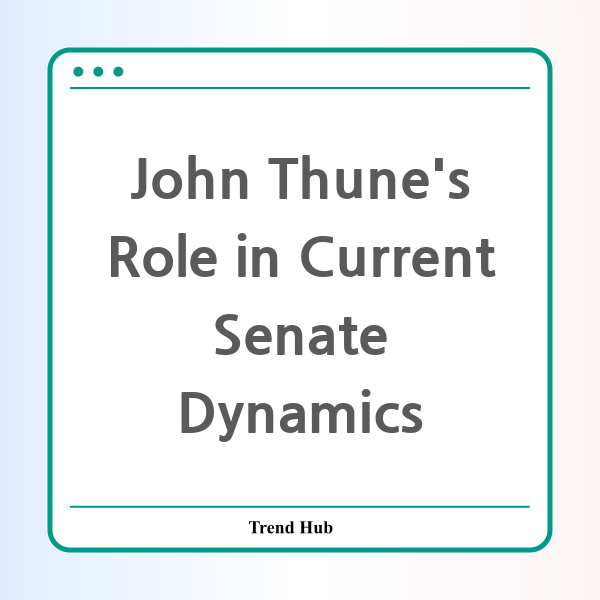* This website participates in the Amazon Affiliate Program and earns from qualifying purchases.

The U.S. Senate is currently a battleground of ideas and political maneuvering, especially as President Donald Trump’s administration seeks to fill key Cabinet positions. One of the prominent figures in this tug-of-war is Senator John Thune, who is not only the Majority Leader but also plays a crucial role in shaping the Senate’s agenda regarding appointments and confirmations.
As the political landscape shifts, the Senate faces intense scrutiny over the confirmation processes of Trump’s nominees. Recently, discussions have emerged about the possibility of recess appointments, a tactic that would allow Trump to appoint individuals without the Senate’s consent during breaks in their sessions. However, many Senate Republicans expressed reluctance to endorse this approach, indicating it might not gain the necessary traction. In a closed-door meeting, Senator Ron Johnson pitched the idea, but the general sentiment echoed a strong commitment to maintaining standard procedures over resorting to recess appointments.
Senator Thune’s leadership is evident as he encourages a smooth confirmation process. He highlighted the desire for efficiency, urging his colleagues to vote on nominees rather than delaying proceedings unnecessarily. "Do we want a vote on these folks on Tuesday or vote on them on Friday, Saturday, and Sunday?" Thune challenged, emphasizing the need for decisive action in the interest of American governance.
Adding complexity to the situation is Senate Minority Leader Chuck Schumer’s support for delaying confirmations of Trump’s nominees who lack unanimous support. This strategic approach aims to ensure a full debate on the qualifications of these nominees, a notion that has been echoed by other Democratic senators. For instance, Senator Chris Murphy has raised concerns about nominees such as John Ratcliffe, nominated for CIA Director, underscoring the importance of thorough vetting in the face of significant power vested in these appointments.
While the divide between parties is widening, Thune remains committed to pushing through confirmations efficiently. He pointed to the bipartisan support Ratcliffe received from the Senate Intelligence Committee, arguing that the vote should reflect that consensus. Thune's comments bring to light the frustration felt by many Republican senators regarding Democrats' delays, framing them as unnecessary stalls that could prolong the administration's ability to govern effectively.
The Senate’s activity surrounding Trump’s nominees lays bare the challenges of balancing party loyalty with the responsibilities of governance. As Democrats rally around the idea of scrutinizing nominees, Republicans like Thune are tasked with navigating this fractured dynamic while trying to uphold the Senate’s traditions and responsibilities.
This ongoing discussion highlights two critical aspects: the importance of leadership in the Senate and the intricate dance of political strategy that is required during times of divided government. It not only demonstrates John Thune’s pivotal role but also reflects a larger narrative about partisanship, governance, and the future of Trump's administration.
As we continue to observe these developments, it will be essential to monitor how Thune’s strategies will impact the confirmation process and the overall harmony of Senate operations in the coming weeks.
* This website participates in the Amazon Affiliate Program and earns from qualifying purchases.